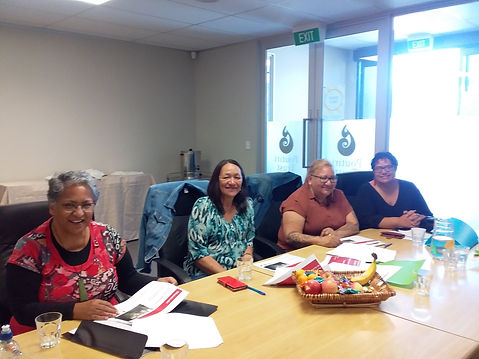Tuakana-Teina Project
There are significant inequities between Māori and non-Māori in ageing outcomes. This study used a strengths-based approach based on the key cultural concept of mana motuhake to develop a Tuakana-Teina peer education programme to assist kaumātua in addressing health and social needs. The purpose of this study was to test the impacts of a Tuakana-Teina programme on those receiving the programme. Three aims identify the impact on outcomes, resources received and the cost effectiveness of the programme.
Methods
The programme was implemented with five Kaupapa Māori (research and services guided by Māori worldviews) iwi and community providers through a participatory approach. The programme involved tuakana (peer educators) having up to six conversations with up to six teina (peer learners) and providing information related to health and social services. Participants completed a baseline assessment of health and mana motuhake measures consistent with Māori worldviews along with a follow-up assessment post-programme. Additionally, five focus groups and open-ended questions on the assessments were used to provide qualitative evaluation.

Findings
A total of 113 kaumātua were recruited, and 86 completed the programme. The analysis revealed improvements in health-related quality of life, needing more help with daily tasks, life satisfaction, trouble paying bills and housing problems. Qualitative results supported impacts of the programme on mana motuhake and hauora (holistic health), through providing intangible and tangible resources. Cost-effectiveness analysis showed that the intervention is cost effective.
A culturally-appropriate, strengths-based programme developed through a participatory approach can significantly improve health and social outcomes in a cost-effective way.
Network Members
-
Poutiri Trust (Te Puke, Bay of Plenty)
-
Te Korowai Hauora o Hauraki (Waikato/Hauraki)
-
Tui Ora (Taranaki/New Plymouth)
-
Te Korowai o Ngāruahine (South Taranaki)
-
Te Roopu Tautoko ki te Tonga (Dunedin)

A teina stated she “had a fantastic turn around with her wellbeing. Things have been rough for [the] teina and her whānau regarding her health. She is doing amazing health wise”
This project seeks to highlight the role of kaumātua as carriers of mātauranga including te reo Māori; intergenerational exchange Intervention building on mātauranga Māori, te reo Māori and physical activity
Methods
Each community provider went through a co-design process to develop four wānanga related to cultural learning and physical activity. Kaumātua and one whanāu member completed a survey about their wellbeing, cultural identity and knowledge and their social relationships before the wānanga began. Then they participated in the wānanga and then had activities after the wānanga to consolidate the learnings. After all four wānanga, the participants complete a follow up survey about the same topics as the first survey and participated in a focus group about their experiences.
Findings
-
Key improvement from before and after the programme in physical functioning.
-
We asked kaumātua to complete five chair stands and measured the time in seconds.
-
Prior to the programme, this took them 14.53 second on average. After the programme, it took them 12.24 seconds.
"I really enjoyed the experience. It was something to look forward to. I also found out a lot more about our history, our whenua, our whakapapa, etc. Sharing our knowledge is very important for ourrangatahi. Sometimes our knowledge is lost because people do not share their stories or resources with others."

Network Members
-
Te Hiku Hauora (Northland)
-
Rauawaawa (Kirikiriroa/Hamilton)
-
Manaaki Ora (Rotorua)
-
Ngati Manawa (Murupara/Bay of Plenty)
-
Turanga Health (Gisborne)
-
Kati Huirapa Runaka o Puketeraki (South
Island)




